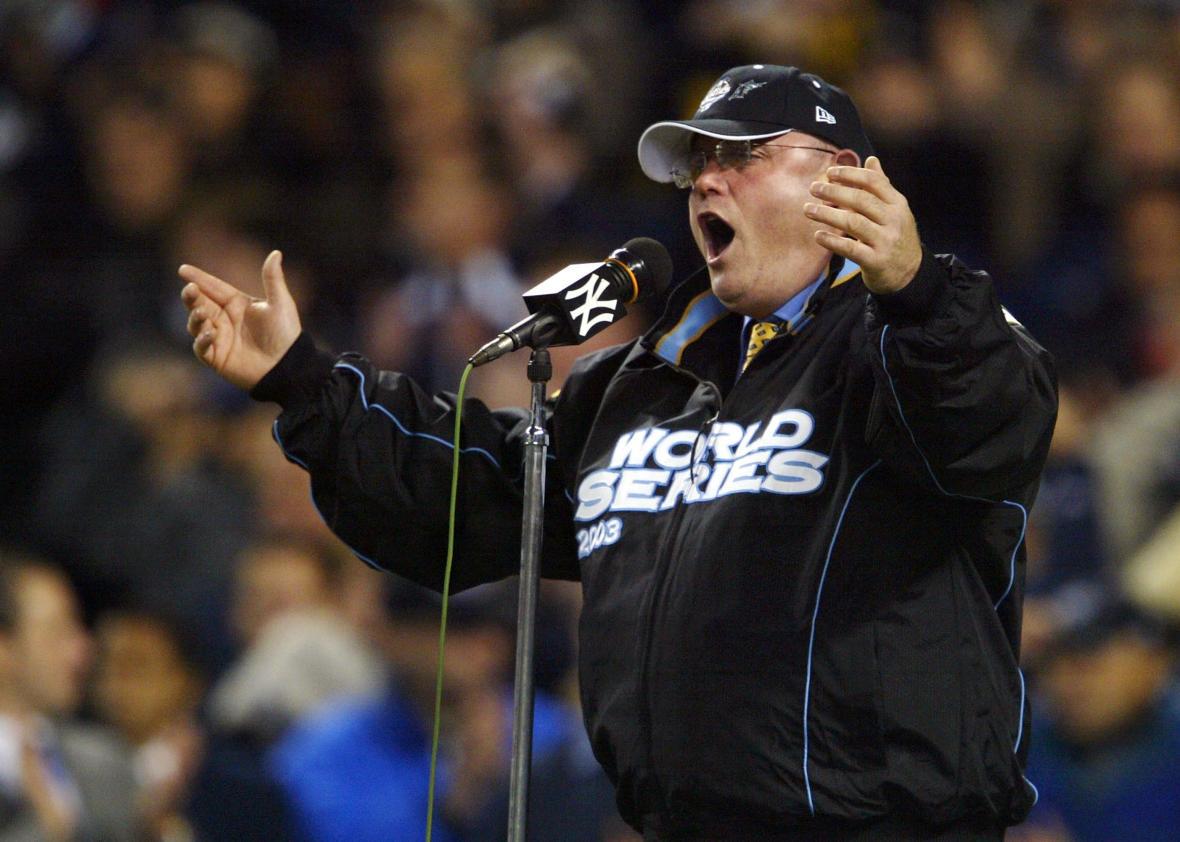Happy Fourth of July weekend! The New York Daily News published a column Thursday calling for the end of singing “God Bless America” at baseball games, and everything it says is right and true. Gersh Kuntzman’s main point is that the song is simply bad, which is beyond dispute. The ritual of singing it, which has turned poor “Take Me Out to the Ballgame” into a bathroom break, is portentous and exhausting.
But, as a Yankees fan, I’ve always held out hope that our own “God Bless America” was secretly implemented as a brilliant piece of sporting strategy. The Yankees were never great at Moneyball, Billy Beane’s revolutionary, statistics-driven player-appraisal technique. But for a while, fans—and even some opposing teams—harbored a conspiracy theory that Irving Berlin’s dull hymn was intended to “freeze” an opposing team’s starting pitcher before he hit the mound in the bottom of the seventh inning.
Like many baseball teams, the Yankees began playing Kate Smith’s recording of “God Bless America” during the seventh-inning stretch after the Sept. 11 attacks. Unlike most teams, they have never stopped. Because the visiting team can’t take the field until afterward, it adds a minute of dead time before the bottom of the seventh. Enough extra time to chill or rattle an opposing starter pushing 100 pitches? Probably not.
It was the Yankees’ playoff routine, though, that made people suspicious. For nearly a decade, the Yanks hired Irish tenor Ronan Tynan to sing a verbose and achingly long rendition of “God Bless America” during the seventh inning of home playoff games.
In 2003, when the Twins were in the Bronx for Game 2 of the American League Division Series, Tynan belted it out. Then Minnesota starter Brad Radke got back on the mound, hit the lead-off man, and the Yankees broke through, winning the game and, later, the series.
The rendition of “God Bless America” had made the inning break a whopping 6 minutes and 20 seconds, about twice the normal length. Twins Manager Ron Gardenhire blamed Tynan for cooling off Radke’s arm.
The Tynan juju continued that fall: In Game 2 of the ALCS against Boston, Derek Lowe also got pulled in the bottom of the seventh after putting on two base runners who went on to score, giving the Yankees a 6–2 lead. And in Game 7, Jason Giambi began the Yankees’ comeback with a seventh inning home run against starting pitcher Pedro Martinez.
The next year, Curt Schilling—pitching in the famous Bloody Sock game—gave up a home run to Bernie Williams in the bottom of the seventh, after Tynan sang the out-of-favor “raise our voices in solemn prayer” introduction. The Yankees lost that game (and, memorably, the series), but Tynan had earned himself a villainous reputation in Boston.
The Yankees have played 52 home playoff games since 2001, and only in a fraction of those has the opposing pitcher gotten into the seventh inning. So the sample size seems too small to properly analyze any “God Bless America” effect. (Interestingly, Philadelphia Flyers fans also believe their team gets good luck from the song.)
At least one doctor thought that the concept of a “God Bless America” strategy was garbage: Ronan Tynan himself, who (when not singing) specialized in orthopedic and sports injuries. “Believe me, I know what rotator cuff syndrome is,” he told Boston Magazine in 2011. “Two minutes and 24 seconds is not going to mess up a pitcher.”
He would say that, though.
